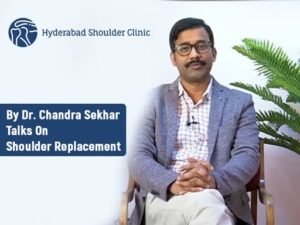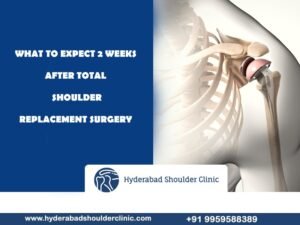A shoulder dislocation occurs when the head of the shoulder (upper arm bone) pops out of the socket (glenoid). Shoulder dislocation can be partial (subluxation), where the humerus bone is partially outside the socket. A more severe case is called a complete shoulder dislocation, in which the humeral head is completely protruded from the socket. Shoulder dislocation is usually associated with other problems, such as ligament or labral tear in the shoulder joint.
Shoulder dislocation can happen to anyone and can be caused by a sports injury, fall, or other accidents that push the shoulder joint out of place. Shoulder dislocations can also occur from overuse as a result of repetitive activity or from previous dislocations that loosen the connective tissue that holds the bone in the socket.
Shoulder dislocation is painful and must be treated immediately. Once the arm is back in position, control options can be considered. Determining the appropriate treatment will depend on several factors, including what the actual shoulder injury is, how many dislocations there are, the patient’s age, the activities or sports they play, and other factors. You need to discuss with the best shoulder surgeon for the most appropriate treatment for your situation.
Dr Chandra Sekhar. B best shoulder surgeon in Hyderabad provides this article which gives information about Shoulder dislocation treatments.
Symptoms of shoulder dislocation:

If you experience any of the following symptoms, you should go to the emergency room for immediate treatment:
- Severe pain in the shoulder, especially in the joints
- Deformity or shoulder clearly out of place
- Inability to move the shoulders or shoulder weakness
- Numbness and tingling
If you are diagnosed with a shoulder dislocation, a shoulder surgeon will work to move your shoulder joint. It’s best to follow up with Dr Chandra Sekhar. B the best shoulder specialist in Hyderabad.
Diagnosis of Shoulder Dislocation:

To diagnose shoulder dislocation, Dr Chandra Sekhar. B will discuss past injuries, assess your symptoms, examine your shoulder and arm, and take your complete medical history. Additional imaging tests may be needed to identify a fracture or accompanying soft tissue injury. These imaging tests include:
- X-ray
- CT scan
- MRI
- Ultrasound of musculoskeletal
Shoulder Dislocation treatment options:

For many shoulder dislocations, surgeons use conservative methods to manage symptoms after the humerus is reinserted into the shoulder cavity. Your doctor may recommend the following non-invasive treatments to reduce pain, swelling, and restore function. Your doctor may recommend one or more of the following non-surgical treatment options:
- Immobilization: Immediately after the reduction, the arm should be held in the sling for 1 to 3 weeks to prevent shoulder movement. But, some arm and wrist exercises can still be done at this time, as suggested by the doctor.
- Ice: Ice can be applied to the injured shoulder 3 to 4 times a day. This can help reduce pain and swelling. Wrap the ice pack in a towel or cloth to prevent burning ice on hand.
- Anti-inflammatory drugs: Nonsteroidal anti-inflammatory drugs such as ibuprofen or aspirin can also help reduce inflammation and pain.
- Physical rehabilitation: A doctor or physical therapist usually creates a rehabilitation program tailored to the patient’s needs and goals. It is an essential part of the recovery process that helps restore function and movement to the shoulder by strengthening the muscles around the shoulder joint.
Possible risk of non-surgical treatment is the potential for recurrent dislocations or shoulder instability. If this develops, doctors will recommend surgical treatment. There are many surgical procedures at Dr Chandra Sekhar B that can improve your shoulder instability.
If your shoulder dislocation is severe and ligaments and tendons are torn, surgery may be needed. Dr Chandra Sekhar. B offers the latest surgical techniques for treating shoulder dislocations and soft tissue injuries, including a minimally invasive approach that allows for faster recovery times and reduced shoulder pain. Your doctor will discuss your options for surgery with you.
Shoulder dislocation surgery:

A shoulder dislocation repairs the damage that occurs when the shoulder pops out of its socket. This may include repairing torn ligaments and tendons or repairing other broken bones that may have occurred during the injury.
Dr Chandra Sekhar. B has extensive experience performing complex surgical treatments for shoulder injuries, including reconstruction and transfer of tendons and ligaments. Dr Chandra Sekhar. B performs many of these specialized surgeries to restore shoulder function and strength and relieve shoulder pain. The surgical procedures we perform for shoulder dislocations include:
Advanced arthroscopic techniques:
Surgeons often use minimally invasive arthroscopic techniques to repair soft tissue and fractures that occur as a result of shoulder dislocation. Your surgeon will make a small incision in your shoulder area and place a very thin tube called an arthroscope with a small light and camera at the end. This allows the surgeon to see structures in and around the shoulder joint and then repair and reconstruct ligaments and tendons and other fractures. The arthroscopic surgical technique allows for faster recovery time and less pain.
Reconstruction and repair of ligaments and tendons:
Torn tendons and ligaments often accompany shoulder dislocations. Repairing the tendons and ligaments may be needed to repair the damage. Using modern arthroscopic techniques, orthopaedic surgeons perform tendon and ligament reconstruction and transfers to improve function and reduce shoulder instability. By strengthening and repairing the tendons and ligaments of the shoulder, the risk of future shoulder sprains is reduced.
Bone transplant:

In certain situations, the shoulder socket or ball can be damaged after dislocating the shoulder. To stabilize the shoulder and prevent further sprains, a piece of bone may need to be moved from another place to the damaged shoulder.
This is often done in conjunction with tendon and ligament reconstruction and can be done arthroscopically or open surgery that depends on your shoulder damage. Dr Chandra Sekhar. B is experienced with this surgical technique and will discuss with you the best treatment options to improve function and reduce shoulder instability.
Recovery from shoulder surgery:
After dislocation, your hands will be placed in the sling for about four to six weeks during the treatment. Your doctor will immediately begin your pain management program and, once you are ready, physical rehabilitation to restore strength and mobility.
A personal rehabilitation program for shoulder dislocations:

Recovery from a dislocated shoulder can take up to several months, depending on the type of surgery performed and the speed of healing. Your orthopaedic team will create a rehabilitation and recovery program tailored to your condition.
Dr Chandra Sekhar. B shoulder surgeons and physical therapists work together to develop a personalized rehabilitation plan that fits your individual recovery needs and goals. Our rehabilitation program provides comprehensive care for each phase of recovery and for as long as necessary until maximum function and mobility are restored.
Conclusion:
The prognosis depends on many factors, including the severity of the shoulder injury, age, and your participation in sports activities. For example, if you are a young athlete and practice contact sports such as football or hockey after a shoulder dislocation, the overall risk of second shoulder dislocation can be as high as 90%. Repeated injuries can make your shoulder so unstable that it will need surgery to repair. Surgery usually restores stability to the shoulder and reduces the risk of future dislocations by 5% or less.
Suppose you are an adult and have an uncomplicated shoulder dislocation. In that case, the risk of recurrent dislocation is small, with re-dislocation occurring only in about 25% in people in their thirties and even less frequently in the older age group. Treatment also depends on age and person to person that can be discussed with a doctor. For more information, contact Dr Chandra Sekhar.B at Dr Chandra Sekhar. B 9959588389.







